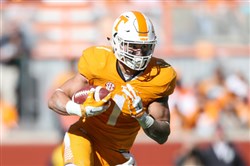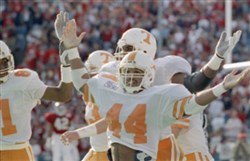VOL. 40 | NO. 18 | Friday, April 29, 2016
Hurd looks to join list of greatest UT running backs

Running back Jalen Hurd has a chance to break Tennessee’s all-time rushing record this season, adding his name to the all-time greats list.
-- Andrew Bruckse/Tennessee Athletics/Utsports.ComWhen Jalen Hurd committed to the University of Tennessee prior to his senior season at Beech High in Hendersonville, he had one goal:
Help UT football get back up and running under Butch Jones.
Mission accomplished.
Along the way, Hurd has stumbled upon another goal:
Set the school’s all-time rushing record.
“I’ve definitely thought about that,” Hurd told reporters during UT’s spring practice. “That would be amazing. That is a goal and something I definitely want to do.”
With 2,187 yards in two years, Hurd enters his junior season 891 yards short of Travis Henry’s UT record. Coming off a 1,288-yard season in 2015, Hurd should break the record by late October or early November if he stays healthy.
Where, then, does Hurd rank among the top running backs in Vols history?
Tennessee has had more than its share of great running backs over the years. Halfback Gene McEver became the school’s first All-America in 1929. None other than legendary coach Bob Neyland called him “the best player I ever coached.” Lofty praise, indeed.
Taking a more modern view of things, let’s look at the last half-century – since 1966.
I have my own ranking of the greatest running backs in UT over that time. Sure, statistics factor into the ranking, but I base this more on what I saw in terms of ability and production as well as how the players impacted the team in a given season.
For the sake of this argument, we’ll omit Hurd until his college career is over, whether it’s at the end of the upcoming season – when he is eligible for the NFL draft – or later.
Here, in order, is my top 10, with the years each played at UT:
1. Chuck Webb, 1989-90
2. Jamal Lewis, 1997-99
3. Charlie Garner, 1992-93
4. Johnnie Jones, 1982-84
5. Travis Henry, 1997-2000
6. Reggie Cobb, 1987-99
7. James “Little Man” Stewart, 1991-94
8. Jay Graham, 1993-96
9. Curt Watson, 1969-71
10. Travis Stephens, 1997-01
Yes, I’m leaving off some quality running backs.
Cedric Houston and Montario Hardesty rank in the top 10 in terms of career rushing yards at UT. Aaron Hayden was a terrific back, but his career intersected those of Stewart and Garner, limiting his carries.
Stanley Morgan is better known as a wide receiver in his NFL career, but he averaged 5.9 yards per carry as a tailback in 1974 and ’75. The list goes on.
So where is Arian Foster? Fair question. He ranks No. 2 in UT’s all-time rushing list at 2,964. But he was not a dominant back, in my book. He never made All-SEC first team. Plus, he had a nasty habit of fumbling at the worst possible time.
As for Webb, he is simply the best running back I have seen at UT. And he doesn’t even rank in the top 25 in career rushing yards at 1,392.
There are mitigating circumstances. Webb was redshirted as a true freshman in 1988. It’s hard to believe now, but such things were commonplace back then. Also redshirted in ’88 when the Vols opened the season 0-6: Carl Pickens.
As a redshirt freshman in 1989, Webb ran for 1,236 yards despite splitting carries with Reggie Cobb until almost midseason. The Cobb-Webb tandem was lethal. But when Cobb was kicked off the team for a fourth failed drug test, the tailback load fell to Webb.
And he was superb. With a rare combination of speed, acceleration and toughness, Webb sometimes seemed unstoppable. Running behind an offensive line that included future first-round draft picks Charles McRae and Antone Davis at tackle, he put up huge numbers.
Webb owns the top two rushing games in UT history: 294 yards against Ole Miss and 250 yards against Arkansas in the Cotton Bowl.

University of Tennessee running back Chuck Webb celebrates after scoring on a 79-yard touchdown run in the third quarter of the 1990 Cotton Bowl against Arkansas. Webb was the offensive player of the game, a 31-27 Tennessee win, with 250 yards rushing.
-- Ap Photo/IkWebb appeared on his way to an even better year in 1990. He carried 27 times for 144 yards against Colorado in the Kickoff Classic. But on his third carry against Pacific the following week, he suffered a major knee injury that ended his season. Webb later declared for the NFL draft, but his knee was never the same.
He lasted two years with the Green Bay Packers but didn’t have a carry from scrimmage in his NFL career. He returned only two kickoffs.
All of which brings us back around to Hurd.
At 6-foot-4 and 240 pounds, he is a load. During the recruiting process, some programs saw him as a tight end or outside linebacker. But Hurd has always played running back, and Jones was unwavering in his promise to let him play his preferred position.
Although he runs with power and explosion, Hurd cuts well in traffic and can be surprisingly elusive. And he is more than just a runner. He has good hands and is a solid target out of the backfield in UT’s passing game. He is also a determined blocker and can be a monster in blitz-pickup situations.
“He’s a rarity when it comes to the skill set he has,” Jones says.
Hurd’s value to the Vols is obvious. When Mike DeBord joined the program as offensive coordinator last season, he put more emphasis on the running game. Hurd responded accordingly. He is comfortable carrying the load.
His impact on the program goes deeper. He committed to UT in March 2013, just three months after Jones was hired and before he had coached a game for the Vols.
Hurd’s commitment helped Jones establish a Midstate beachhead that ultimately led to the signing of such talents as Derek Barnett, Josh Malone, Jashon Robertson and Rashaan Gaulden.
In time, Hurd likely will own the school’s career rushing record.
While we’re doing the numbers, though, it should be noted that the rushing totals of Henry, Lewis and several others do not include yardage gained in bowl games. Why? Because the NCAA didn’t recognize bowl stats as part of a player’s season total until 2002.
That means Henry has been shortchanged 239 postseason yards, including 180 in his final college game, the Cotton Bowl. It is likely that somewhere down the line, UT will follow the lead of other schools and retroactively include stats from bowl games in a player’s career total.
If so, Henry’s all-time Vols record would increase from 3,078 yards to 3,317. Hurd would need 1,131 yards to pass him.
Fine. Something tells me if Jalen Hurd needs to tack on those extra yards to set the record, he’s up to it.
And when that happens, he will take his rightful place among the greatest running backs in Tennessee football history.
Reach David Climer at [email protected] and on Twitter @DavidClimer.